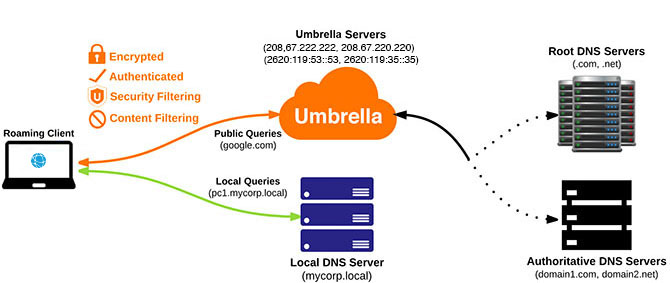Introduction
What is the Umbrella Roaming Client?
The Umbrella roaming client is a lightweight DNS client that runs on your Windows or Mac OSX computers. It is not a VPN client or a local anti-virus engine. It allows Umbrella security and policy-based protection, including our intelligent proxy, to be enforced no matter to which network you are connected. Whether you're at the office, your hotel, a coffee shop, or using a mobile hotspot, the Umbrella roaming client enforces policies set by you in Umbrella.
For more information about the roaming client, see Secure remote workers with the Cisco Umbrella roaming client.
How Does It Work?
On Windows, the Umbrella roaming client binds to 127.0.0.1:53 (localhost for IPv4) and [::1]:53 (localhost for IPv6) and sets itself as the exclusive DNS server on every network connection on your computer, ensuring that all DNS requests are directed to the closest Umbrella data center, while gracefully handling local network resources using internal domains. On macOS, the Umbrella roaming client binds only to 127.0.0.1:53 (localhost for IPv4).
The DNS queries sent through Umbrella are encrypted, authenticated, and subjected to security and content filtering as dictated by your organization's administrator. If the computer attempts to reach a domain name which either Umbrella or your organization's administrator considers unsafe, the computer's browser gets directed to a safe block page.

The Umbrella roaming client gracefully decides between several states under which to operate, depending on its environment.
It’s important to know that the Umbrella roaming client does not store cached DNS records or responses. The Umbrella roaming client respects TTLs as set by the domain's DNS properties just as the computer (without the Umbrella roaming client) normally would.
What are the Benefits of the Umbrella Roaming Client?
With our traditional network-based service, or with most traditional appliance-based network perimeter gateways, there are two limitations that are overcome with the Umbrella roaming client:
- Roaming / Off-network—If a laptop leaves the office and is not using a full-tunnel VPN at all times (which can be slow), the laptop is unprotected from threats and undesirable content while roaming outside of the network.
- Granular Reporting and Filtering—All the DNS traffic visible in your Umbrella reports come from a single network identity. The Umbrella roaming client provides computer-level granularity that is specified in policies that you set up in Umbrella. Not only can you enforce different security and content filtering settings on a per-computer basis, but you also see computer-level reports.
Does It Work With VPNs?
Yes! The Umbrella roaming client works with most split-tunnel and full-tunnel VPNs.
Be aware that there are some special considerations with Cisco split-tunnel VPN's that are outlined here: Umbrella Roaming Client: VPNs and VPN Compatibility.
For a list of incompatible VPN clients, see Umbrella Roaming Client: VPNs and Software Compatibility.
Can I Still Run Antivirus and Endpoint Security Software?
Yes! The Umbrella roaming client's only function is to handle DNS requests, so third-party security software should not interfere with the Umbrella roaming client. All the heavy processing is done in the Umbrella data centers and in the cloud, so there's no slowness like that associated with traditional antivirus.
I'd Like to Know More About the Umbrella Roaming Client, Where do I Look?
We have a great video that goes through some of the common FAQs in more depth. Find out how the Umbrella roaming client works and why you should use it: Watch.
Questions?
For more information, see the Umbrella Roaming Client Knowledge Base.
Introduction > Prerequisites
Updated about 4 years ago
